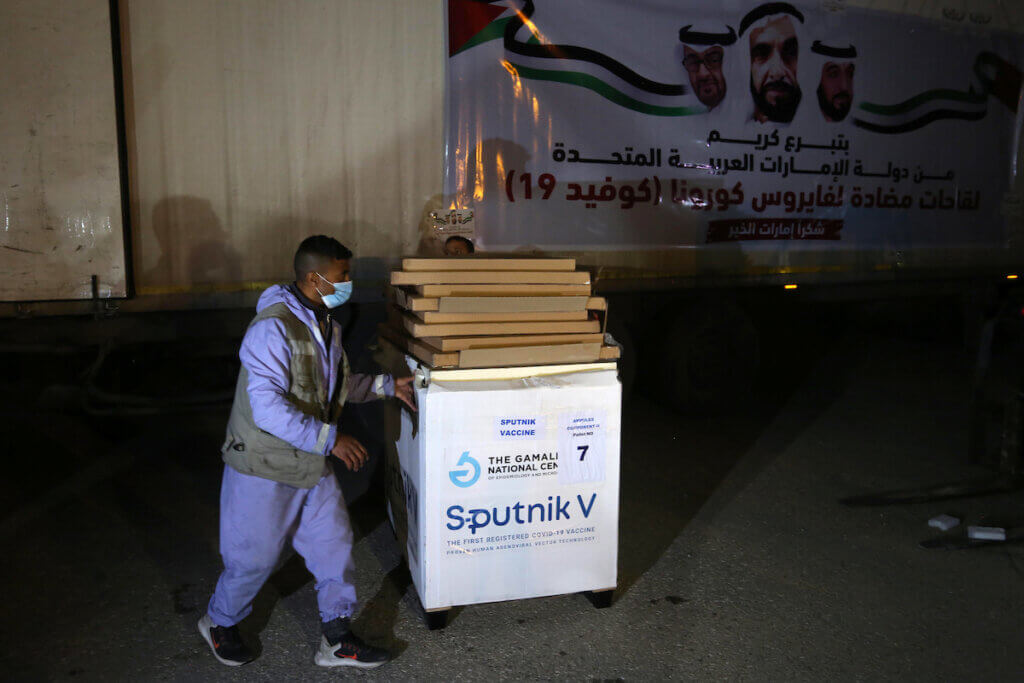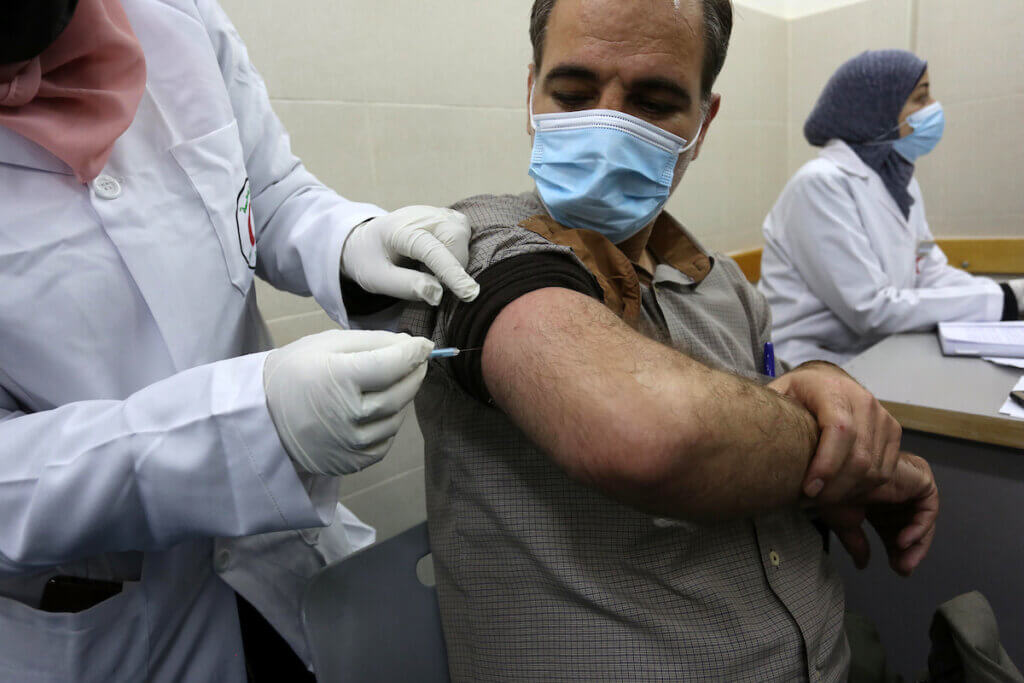In an empty ward at Al-Shifa hospital used to treat COVID-19 patients before transferring them to the specialized departments sits Dr. Mohammed Abdelmanem, a 47-year-old pulmonologist who expects to get a first dose of the coronavirus vaccine this week. The schedule was outlined by Gaza’s ministry of health, and Abdelmanem will be among the first few thousand to be inoculated out of a population of almost two million. He says he’s looking forward to finally not being afraid.
“It is really reassuring that now we can go back home without all the worries,” he said, later adding, “that was a real danger to go home every time with worry that you may infect your family.”
Indeed, that is just what happened last summer when he, his wife, and their four children all tested positive for COVID-19. While treating COVID-19 patients, Abdelmanem said he and other healthcare workers, “shielded ourselves with the simplest means: masks and the protective suits were our only forms of PPE, though myself and many of my colleagues became infected.”
Gaza has been under Israeli occupation since 1967 and since 2007 under an Egyptian and Israeli blockade, severely limiting the entrance and exit of essential goods. With medications at 50% stock and limits on the number of hospital beds, “the only option we had then was to quarantine and take some pain-killers,” Abdelmanem said.
“The kids got through it much easier than my wife who was in poor condition,” Abdelmenem recalled. “When we got infected, we separated inside the home, and those were the most painful moments.”
“For months, I could not go to see my parents, they live in the same building but I stayed away from them,” Abdelmanem said.
“Even after my family and I recovered,” Abdelmanem said, “I kept away from my older parents. I did not feel safe at all over the past year and it was an unbearable year, but I thank God that we are still alive.”

At least 1,940 healthcare workers have already tested positive for COVID-19 in Gaza, according to Dr. Hani Wihidi who works in the coastal enclave’s central lab. Since the pandemic began last March 56,727 have tested positive and 564 have died. Presently, there are around 2,000 known active cases, although UN officials say that low testing supplies in Gaza are likely masking a wider outbreak.
“At the beginning of the COVID-19 pandemic, we watched the casualties around the world and the situation was very tough and terrifying. Thousands of people were contracting the disease, and in developed countries health systems collapsed. It would be nightmare for Gaza if casualties were similar,” Abdelmenem said.
Before Abdelmenem receives his first jab in the arm he will be given an antibody test. If he tests positive, the ministry of health guidelines would prevent him from receiving a vaccination. While it is unknown how long immunity after infections last, most studies have shown at least six months of protection. Last December, the WHO’s Dr. Maria Van Kerkhove warned, “individuals can be reinfected with this virus,” adding, “we don’t know how often this is happening.”
Thus far Gaza has received 20,000 doses of Russia’s Sputnik V vaccine donated by the UAE and 2,000 purchased by the Palestinian Authority, which are administered at six locations across the territory. Another 40,000, also procured by the UAE, are due to arrive in the coming weeks, however, the timeline for a wider vaccination program is still unclear. Dr. Nidal Ghanim, an epidemiologist at Gaza’s central COVID-19 testing lab said at this time the ministry of health has plans to secure vaccines for 60% of the population.
Abdelmenem anticipates the rollout will be marred by delays. During the first few months of the pandemic, he said there was a crisis over a lack of testing kits that were slow to arrive.
Gaza’s ministry of health identified the priority will be front-line workers, including doctors, nurses, hospital administrative employees, EMTs, and others who are in direct contact with COVID-19 patients. The second tier will vaccinate Palestinians age 55 and older, and individuals with chronic diseases.
The ministry of health released an online application in late February for people to sign up for the roster.
“Now the atmosphere is different,” said Abdelmanem. “Doctors can be more certain of our safety, so our energy will be at a maximum.”
“Even so, I still keep social distance with my parents when I see them now. But, after I get vaccinated, I can sit with them without fear.”



1 of 2
Lest we forget:
As Human Rights Watch declared in 2005: “…Israel will continue to be an Occupying Power [of the Gaza Strip] under international law and bound by the provisions of the Fourth Geneva Convention because it will retain effective control over the territory and over crucial aspects of civilian life. Israel will not be withdrawing and handing power over to a sovereign authority – indeed, the word ‘withdrawal’ does not appear in the [2005 disengagement] document at all… The IDF will retain control over Gaza’s borders, coastline, and airspace, and will reserve the right to enter Gaza at will. According to the Hague Regulations, ‘A territory is considered occupied when it is actually placed under the authority of the hostile army. The occupation extends only to the territory where such authority has been established and can be exercised’. International jurisprudence has clarified that the mere repositioning of troops is not sufficient to relieve an occupier of its responsibilities if it retains its overall authority and the ability to reassert direct control at will.”
The International Committee of the Red Cross: “The whole of Gaza’s civilian population is being punished for acts for which they bear no responsibility. The closure therefore constitutes a collective punishment imposed in clear violation of Israel’s obligations under international humanitarian law. The Fourth Geneva Convention of 1949, ratified by Israel, bans collective punishment of a civilian population.”
“In practice, Gaza has become a huge, let me be blunt, concentration camp for right now 1,800,000 people” – Amira Hass, 2015, correspondent for Haaretz, speaking at the Forum for Scholars and Publics at Duke University. Hass, an Israeli who has won numerous awards for her reporting, has been covering the region since the early ’90s.(cont’d)
2 of 2
“‘The significance of the [then proposed] disengagement plan [implemented in 2005] is the freezing of the peace process,’ Prime Minister Ariel Sharon’s senior adviser Dov Weisglass has told Ha’aretz. ‘And when you freeze that process, you prevent the establishment of a Palestinian state, and you prevent a discussion on the refugees, the borders and Jerusalem. Effectively, this whole package called the Palestinian state, with all that it entails, has been removed indefinitely from our agenda. And all this with authority and permission. All with a [U.S.] presidential blessing [i.e. President George Bush] and the ratification of both houses of Congress.’ Weisglass, who was one of the initiators of the disengagement plan, was speaking in an interview with Ha’aretz for the Friday Magazine. ‘The disengagement is actually formaldehyde,’ he said. ‘It supplies the amount of formaldehyde that is necessary so there will not be a political process with the Palestinians.’” (Top PM Aide: Gaza Plan Aims to Freeze the Peace Process, Ha’aretz, October 6, 2004)